I'm Rachael
Mom of 3 & Baby Sleep Expert with Big Sis Energy
& I’VE DONE ALL THE RESEARCH FOR YOU ALREADY.
Better sleep for the entire family
BROWSE COURSES
hey!
the 18 month sleep regression (or PROgression!) and what to do
What’s your toddler up to at 18 months?

What’s up at 18 Months? Well- a lot! This is one of my favorite ages ever. There are so many fun things to do with your 18 month old and they are learning SO many new things! Here are some milestones you might notice around this age. As always, remember that every child develops at a slightly different pace, and that’s normal! Talk with your trusted healthcare provider if you’re concerned about your 18-month old’s development.
-
Understanding some concepts like “in” or “on top”
-
Having more frequent tantrums
-
Showing affection to favorite people
-
Going through another phase of separation anxiety
-
Playing pretend
-
Walking on their own
-
Feeding themselves using pincer grasp, forks and spoons
-
Squatting to pick things up
-
Drinking from an open cup
-
Saying “no” and shaking their head
-
Saying more words and maybe putting 2 words together
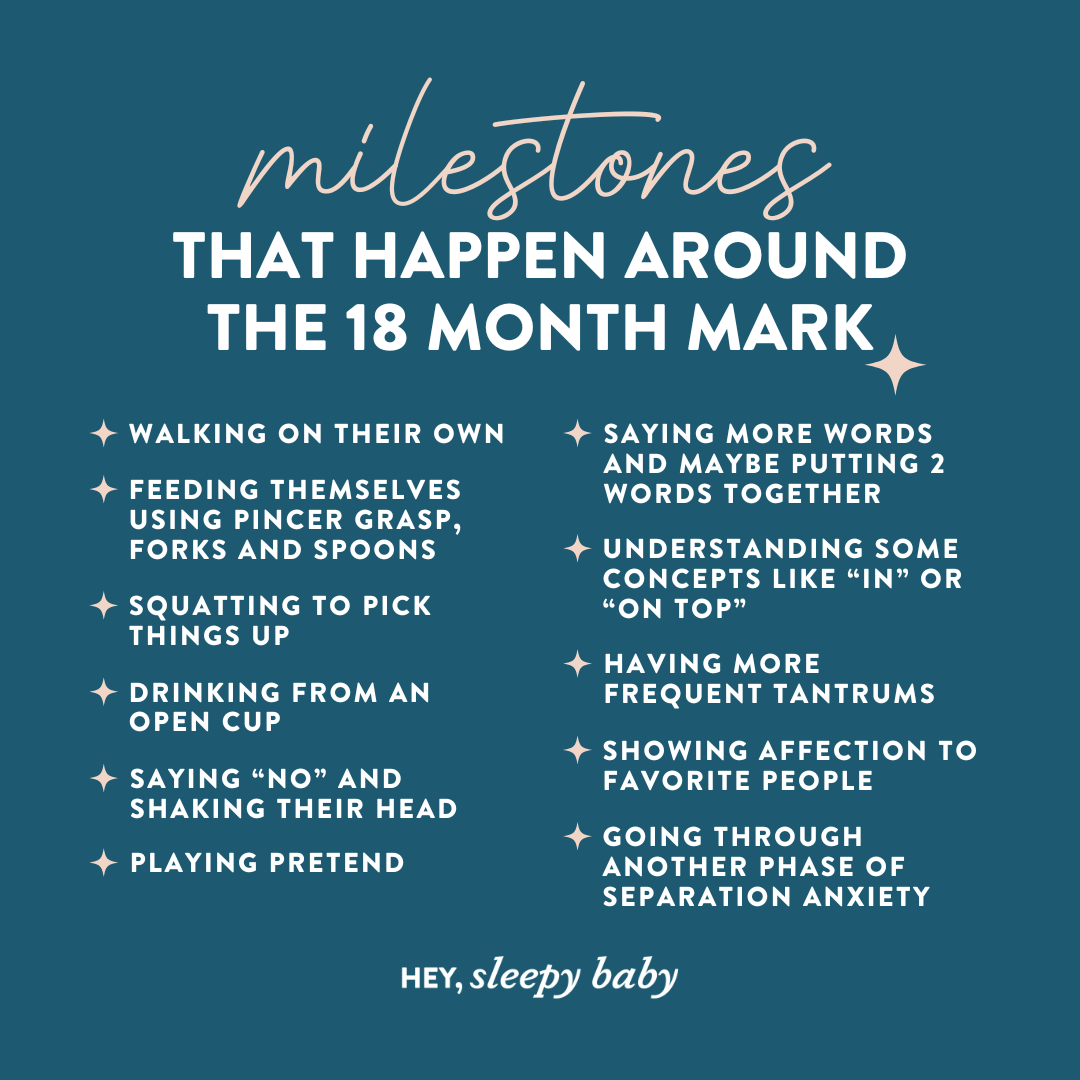
All of this learning may come at a price, though- and that may be sleep. It’s true that “sleep regressions” aren’t really a thing but that you may notice sleep backslide during big periods of growth or bursts of development. And the 18 month mark definitely fits the bill! There may be some changes to sleep around this age and you may notice increased difficulty with getting your toddler down for naps or nights. You may also notice an uptick in nighttime feeds if your little one is still nursing or taking a bottle. All of this is very common.
sleep schedules at 18 months
-
At 18 months, most toddlers have wake windows of 4-6 hours.
-
Total sleep remains at about 11-14 hours total per 24 hours.
-
Likely on one, mid day nap of 1-3 hours.
-
Bedtime might be a bit earlier now since there is just one nap. Most toddlers still do well with bedtime somewhere between 7-9pm, depending on total sleep needs, the family’s schedule, and desired morning wake time. Depending on the nap length and your child’s total sleep needs for the day, overnight sleep may be somewhere between 10-12 hours. This means an early 7pm bedtime may result in a pretty early morning!
-
Your toddler likely needs support to fall asleep and may still wake overnight for a feeding. Some toddlers still wake at night at 18 months and need a cuddle, feed, or just some reassurance to go back to sleep. This is totally normal! You can read more about supporting your toddler’s sleep here.
-
Breastfeeding at this age is still common throughout the night, however it’s ok to set boundaries around this as your 18 month old has an increasing ability to understand language and cause/effect. If your toddler is on bottles you might be thinking about how to wean them overnight and at bedtime to protect their oral health. Information on all of this can be found inside the Night Weaning Workshop and on the Hey, Sleepy Baby IG page under “weaning” and “night weaning” highlights.
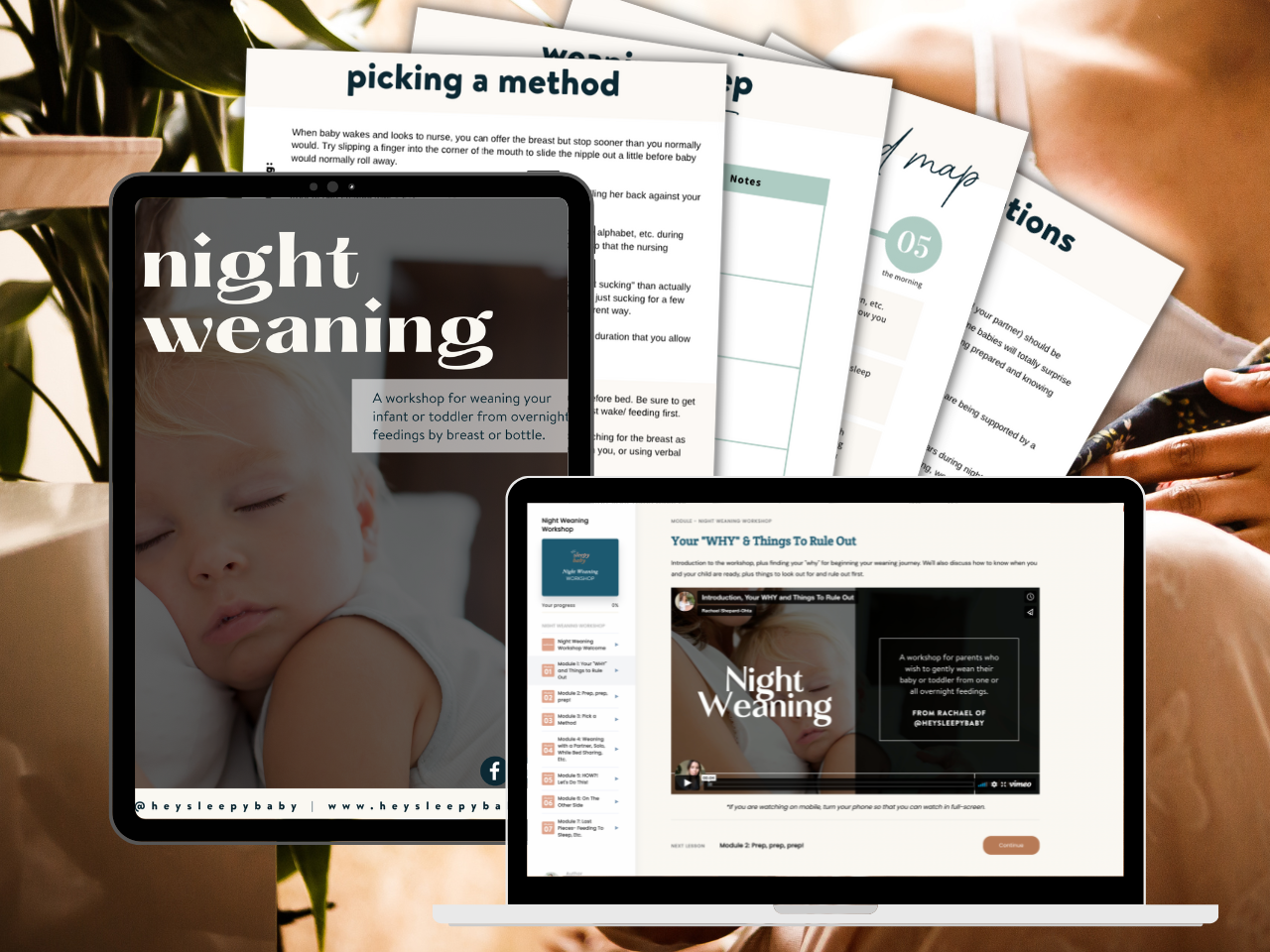
The 18 Month Sleep “Regression”
Even if your baby has been sleeping through the night, they may become more wakeful, resist naps, have a hard time going down for bed, etc. around this age. There are so many reasons for this:
-
Separation anxiety spikes at this age. Your toddler is likely very clingy and may go through periods of parental preference as well.
-
Teething continues, maybe molars are starting to come through if they haven’t yet.
-
Nap transitions (to one nap) are common by this age. By 18 months most children are on one mid-day nap per day. This can change up when bedtime and morning wake time is.
-
Sleep needs also decrease in the second year, so your toddler could be ready for a bit more wake time between naps and before bed. If you’re noticing bedtime battles, you may consider whether the nap is too short or long and consider tweaking bedtime as well.
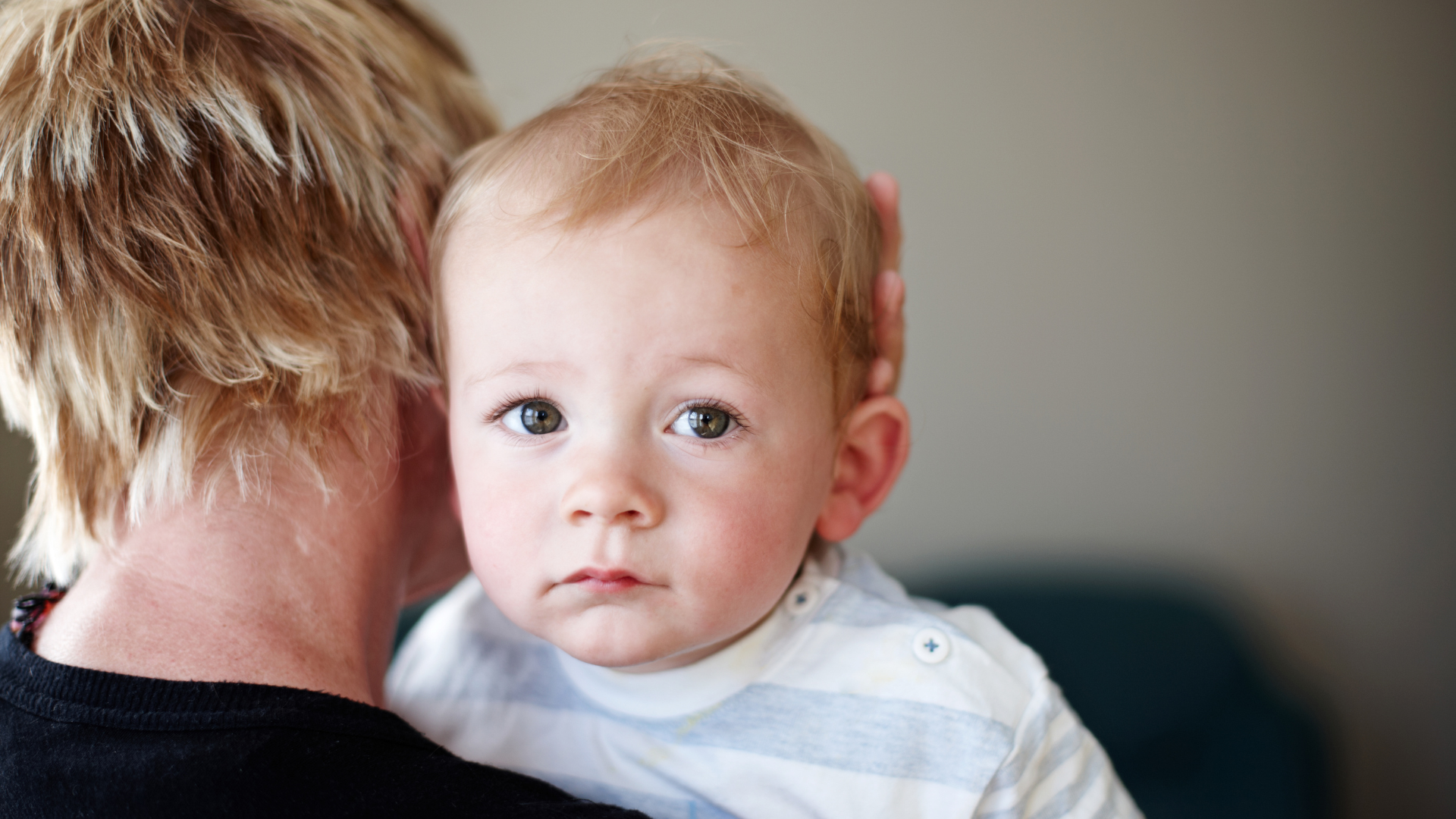
What to do about the 18 month sleep regression (or PRO-gression!)
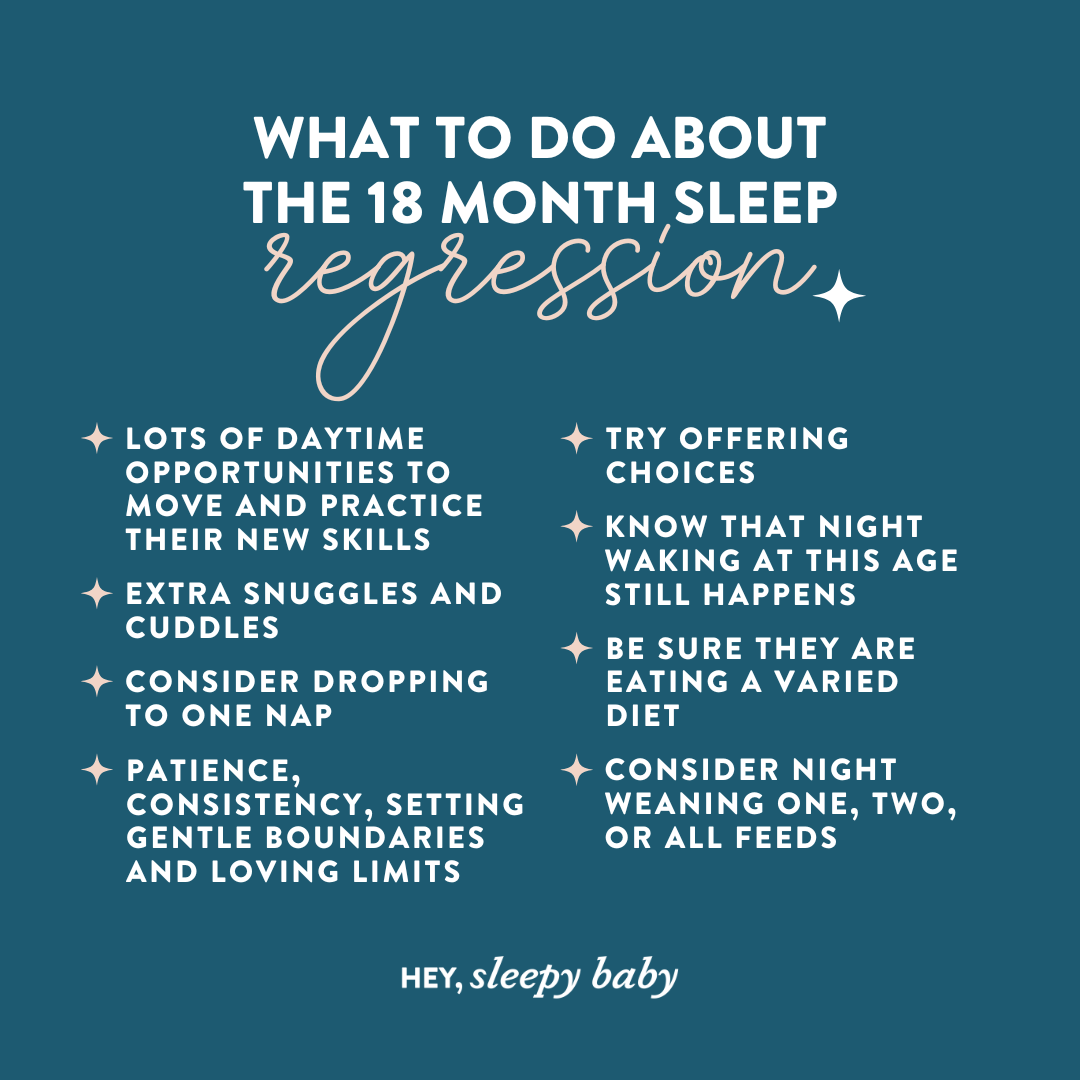
While we can’t stop development (nor should we want to!) there are some things we can do to support our child during this phase and to help optimize sleep for everyone:
-
Lots of daytime opportunities to move and practice their new skills, including plenty of outdoor time for free play, fresh air and Vitamin D
-
Extra snuggles and cuddles, keep them close as much as you can in the evenings. If you’re going to leave let them know. Make sure bedtime is a time of connection and calm vs. rushing and distraction.
-
If you haven’t yet, and nap times are a struggle, consider dropping to one nap. Keep track of how a long vs. short nap impacts your child’s mood plus their nighttime sleep.
-
Toddlers this age need lots of patience, consistency, setting gentle boundaries and loving limits, and some ability to make choices.
-
Try offering choices like “blue PJ’s or Dino PJ’s?” throughout the day so that they can feel some sense of control.
-
Know that night waking at this age still happens! If your baby is still waking up and needing some support to get back to sleep there doesn’t necessarily mean there’s something wrong.
-
Be sure they are eating a varied diet with lots of fat and protein and fresh produce, especially foods high in iron. Consider adding a bedtime snack if they are still waking up and feeding often throughout the night.
-
If you’re still nursing and wanting to shift any patterns at night, you may consider night weaning one, two, or all feeds. You do not have to wean until you’re ready, and doing so won’t guarantee better sleep. However, it is an option and does sometimes help little ones consolidate their sleep. I wouldn’t recommend weaning if your little one is in the thick of a regression, teething, ill, or experiencing severe separation anxiety. Best to wait for any big storm to pass before tackling weaning! My Night Weaning Workshop can help you wean from one or all night feeds (breast or bottle) and feeding to sleep.
-
If you are really struggling with your toddler or older child at bedtime, there are a few other things to consider. Check out the HSB Better Bedtimes Guide (geared towards children 18 months and up) for some more ideas to make Bedtime the best part of your day!
-
If you are looking to move on from cosleeping or to make other supported changes to your little one’s sleep, then check out our Tender Transitions Course. This brand-new course combines 2 of our most popular workshops ever, plus a whole module of new material on sleep, attachment, and mindset. This 3-Module Course teaches you step by step how to move away from any sleep sitch that’s no longer working for you- whether it’s bouncing or rocking to sleep, feeding to sleep or cosleeping/ bed sharing
-
Grab the Toddler Bundle which includes both the Tender Transitions Course and Better Bedtimes Guide.
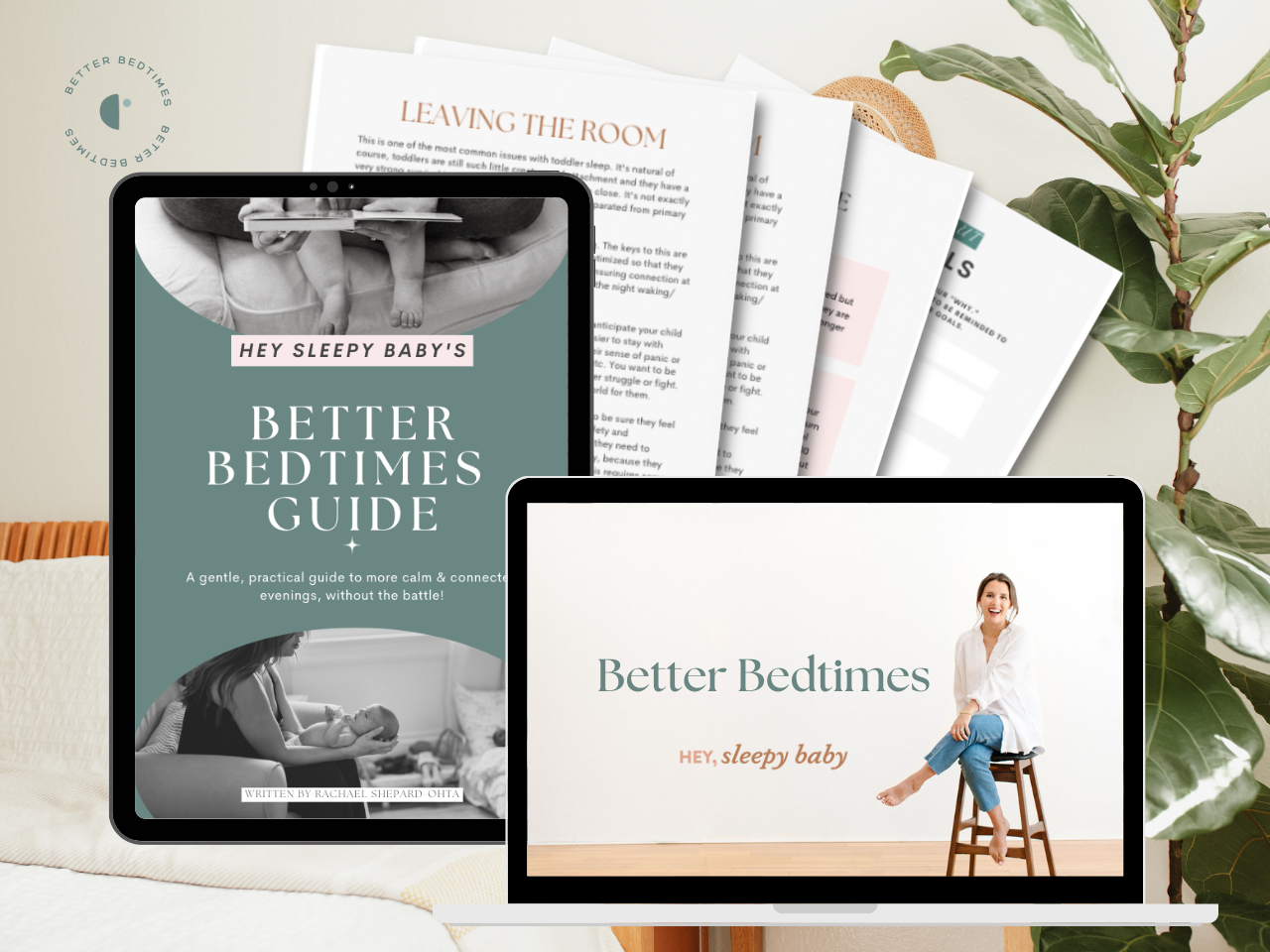
Was this helpful? Save it for later!
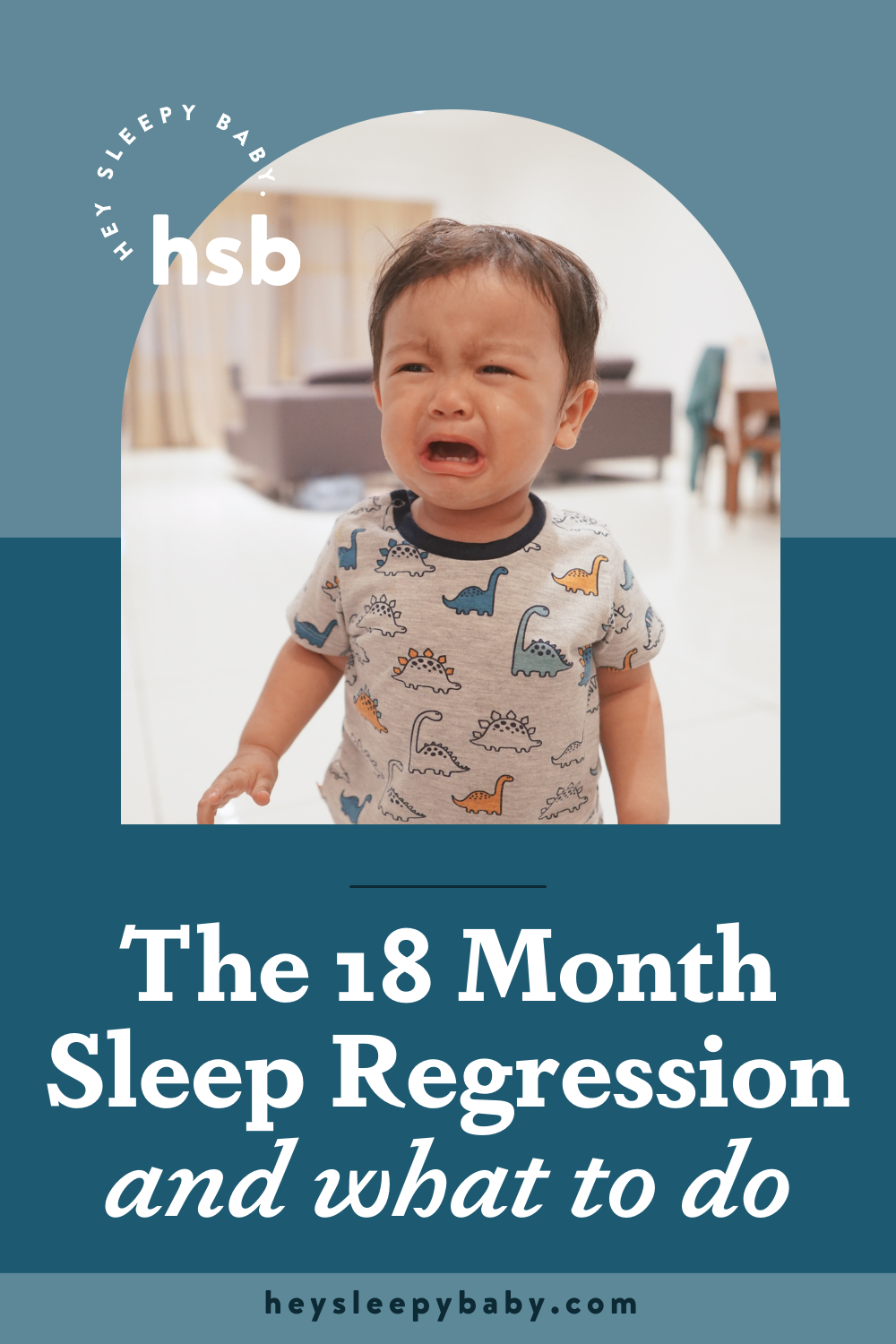
binge reads
We think you'll love these
You deserve to the
baby stage, not just "survive it."
And you DON'T have to sacrifice your values, ignore your instincts, or force yourself to follow a method you don't align with just to get your baby back to sleep.
I’m here to help you create a restful, sustainable sleep environment that honors both your baby’s needs AND your own (without the stress OR the guilt!) because, no, you don’t have to choose between the two.
enjoy!
BABY SLEEP COURSES →
BABY SLEEP CONSULTS →
Wish you could help your baby sleep better without resorting to sleep training? Download my FREE guide to a good night’s sleep and learn 8 simple, science-backed tips for supporting your child’s needs.
Traditional sleep training methods don’t have to be your solution to better sleep.
SLEEP TRAINING ISN’T THE ONLY WAY TO GET GOOD SLEEP
Hey, I'm Rachael and Hey, Sleepy Baby is for parents who want to get their nights back, without sleep training their babies.
NO ONE TOLD US POD
explorING the untold truths of parenting


